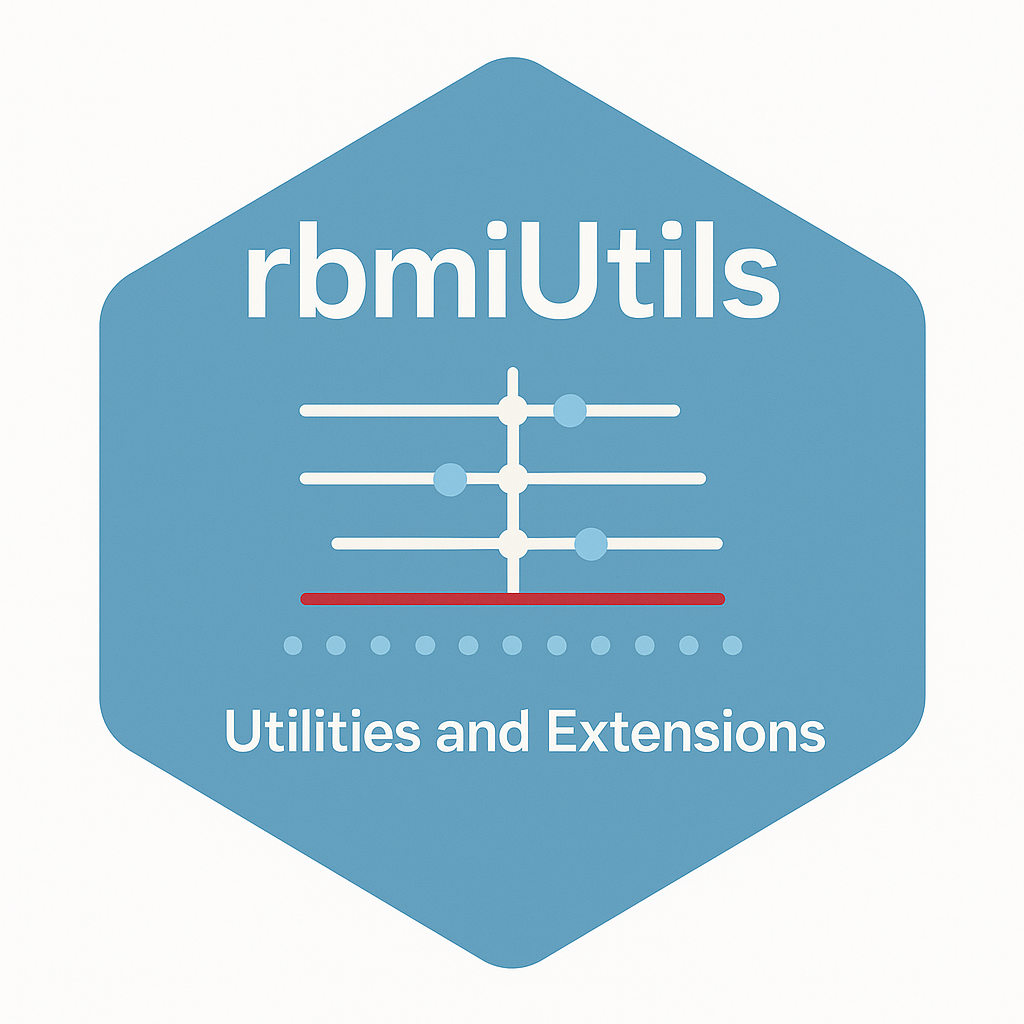

rbmiUtils extends the functionality of rbmi
to support more streamlined workflows for multiple imputation in
clinical trials. It is designed to simplify key tasks such as analysis
execution, pooling, result tidying, and imputed data handling.
You can install the package from cran or the development version of
rbmiUtils from GitHub:
| Type | Source | Command |
|---|---|---|
| Release | CRAN | install.packages("rbmiUtils") |
| Development | GitHub | remotes::install_github("openpharma/rbmiUtils") |
This example shows how to run a covariate-adjusted ANCOVA on imputed datasets using Bayesian multiple imputation:
library(dplyr)
library(rbmi)
library(rbmiUtils)
data("ADMI")
# Setup
N_IMPUTATIONS <- 100
WARMUP <- 200
THIN <- 5
# Preprocessing
ADMI <- ADMI %>%
mutate(
TRT = factor(TRT, levels = c("Placebo", "Drug A")),
USUBJID = factor(USUBJID),
AVISIT = factor(AVISIT)
)
# Define analysis variables
vars <- set_vars(
subjid = "USUBJID",
visit = "AVISIT",
group = "TRT",
outcome = "CHG",
covariates = c("BASE", "STRATA", "REGION")
)
# Specify imputation method
method <- rbmi::method_bayes(
n_samples = N_IMPUTATIONS,
control = rbmi::control_bayes(
warmup = WARMUP,
thin = THIN
)
)
# Run analysis
ana_obj <- analyse_mi_data(
data = ADMI,
vars = vars,
method = method,
fun = ancova
)
# Pool results and tidy
pool_obj <- pool(ana_obj)
tidy_df <- tidy_pool_obj(pool_obj)
# View results
print(tidy_df)
#> # A tibble: 6 × 10
#> parameter description visit parameter_type lsm_type est se lci
#> <chr> <chr> <chr> <chr> <chr> <dbl> <dbl> <dbl>
#> 1 trt_Week 24 Treatment … Week… trt <NA> -2.17 0.182 -2.53
#> 2 lsm_ref_Week 24 Least Squa… Week… lsm ref 0.0782 0.131 -0.179
#> 3 lsm_alt_Week 24 Least Squa… Week… lsm alt -2.09 0.126 -2.34
#> 4 trt_Week 48 Treatment … Week… trt <NA> -3.81 0.256 -4.31
#> 5 lsm_ref_Week 48 Least Squa… Week… lsm ref 0.0481 0.185 -0.316
#> 6 lsm_alt_Week 48 Least Squa… Week… lsm alt -3.76 0.176 -4.11
#> # ℹ 2 more variables: uci <dbl>, pval <dbl>The package includes two example datasets for demonstrating imputation and analysis:
ADEFF: An example efficacy dataset for with missing
data.ADMI: A large multiple imputation dataset with 100,000
rows and multiple visits, treatment arms, and stratification
variables.Use ?ADEFF and ?ADMI to view full dataset
documentation.
Key exported functions include:
analyse_mi_data(): Applies an analysis function (e.g.,
ANCOVA) to all imputed datasets.tidy_pool_obj(): Tidies and annotates pooled results
for reporting.get_imputed_data(): Extracts long-format imputed
datasets with original subject IDs mapped.These utilities wrap standard rbmi workflows for
improved reproducibility and interpretability.
This package is experimental and under active development. Feedback and contributions are welcome via GitHub issues or pull requests.